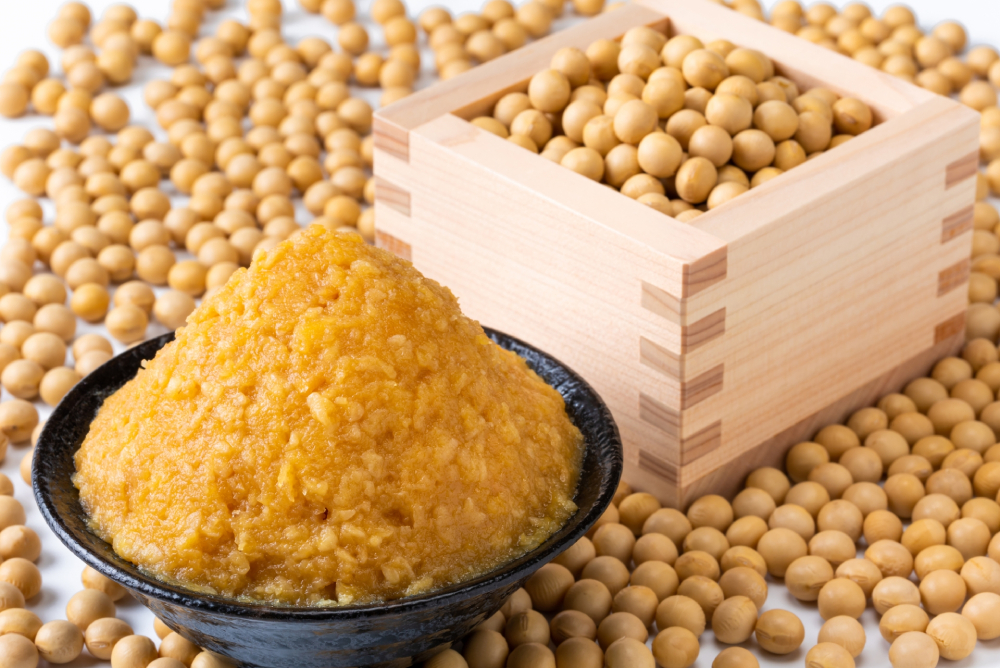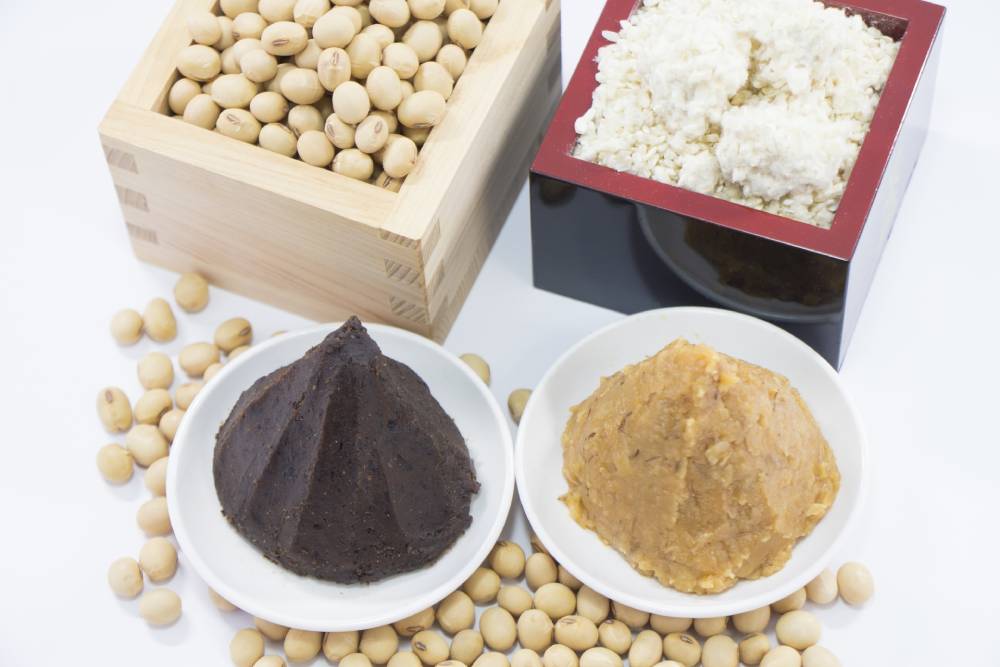Is Miso Really Healthy? What are the Health Benefits?


I’ve heard miso is healthy but I also heard that miso contains a lot of salt. Is it really safe?
Miso has been the essential Japanese diet for as long as 1300 years. It has been said in Japan that “miso keeps the doctor away”. Miso is incredibly nutritious and has a variety of health benefits, such as Strengthen your immune system and reduce the risk of cancer.

Let’s look at why it is so healthy, its health benefits, and if it’s safe for everyone.
What is Miso?

Miso (みそ/味噌) is a traditional Japanese seasoning. It’s fermented soybean paste made from soybeans, salt, and koji. Koji (麹) is the product of rice grains, wheat, or soybean being inoculated with a bacteria called Aspergillus oryzae.
Why Miso is Healthy
Soybeans, the main ingredient of miso, become nutritionally superior during the fermentation process. Fermentation produces a large amount of amino acids and vitamins that are very little or even not found in soybeans. Proteins hydrolyzed by enzymes become the nine essential amino acids: histidine, isoleucine, leucine, lysine, methionine, phenylalanine, threonine, tryptophan, and valine. These amino acids cannot be made by the body, they must come from food.
-Soybeans become more nutritious by fermentation.
-A large amount of amino acids and vitamins are created by fermentation.
Nutrition Facts
Miso also contains many other nutrients such as vitamins, minerals, and dietary fiber. No other food contains so much nutrition. One ounce (28 grams) generally provides you the below.
| Calories | 51kcal |
| Protein | 3.5g |
| Fat | 1.7g |
| Carbs | 6.1g |
| Cholesterol | 0g |
| Sodium | 1400mg |
| Potassium | 110mg |
| Calcium | 28mg |
| Magnesium | 21mg |
| Rin | 48mg |
| Iron | 1.1mg |
| Zinc | 0.3mg |
| copper | 0.11mg |
| Vitamin K | 3μg |
| Vitamin B1 | 0.01mg |
| Vitamin B2 | 0.03mg |
| Niacin | 0.4mg |
| Vitamin B6 | 0.03mg |
| Folic acid | 19μg |
| Soluble dietary fiber | 0.2g |
| Insoluble dietary fiber | 1.2g |
| Monounsaturated fatty acids | 0.31g |
| Polyunsaturated fatty acids | 1.01g |
Source: Standard Tables of Food Composition in Japan in 2020
The Health Benefits of Miso
Having miso soup every day boosts your immune system and prevents disease.
Improves your gut health and Strengthen your immune system

About 70% of immune cells are in the intestine, so if the intestinal environment is disturbed, the immune system will also be weakened. In other words, in order to improve the function of immune cells and enhance your immune system, it is important to keep your intestinal environment healthy.
Your gut is home to 100 trillion bacteria. Some are good bacteria (probiotics), while others are bad bacteria.
Eating Miso that contains lactic acid bacteria every day increases the number of probiotics in your intestines. Also, dietary fiber in soybeans and koji becomes food for probiotics.
Therefore, miso is an ideal food to maintain a healthy gut and boost your immune system.
Miso improves your intestinal health. Consequently, your immune system becomes stronger.
May Reduce the Risk of Stomach Cancer

Dr. Takeshi Hirayama of the National Cancer Center Research Institute conducted a 13-year epidemiological survey of about 270,000 people nationwide.
The research showed that people who have miso soup more often have a lower death rate from stomach cancer. For men, those who did not have miso soup at all had a 48% higher death rate from stomach cancer than those who have miso soup every day.
In addition, smokers clearly have a higher death rate from stomach cancer than nonsmokers, but smokers who have miso soup every day had a 38% lower death rate.
These reports suggest that miso soup or miso may contain substances that suppress carcinogenesis, but we still don’t know what kind of substance it is and how they suppress carcinogenesis.
-Having miso soup every day lowers the death rate from stomach cancer.
-Miso may contain substances that suppress carcinogenesis.
May Reduce the Risk of breast cancer

The National Cancer Center investigated the relationship between isoflavone intake and breast cancer rate. This is a 10-year follow-up survey of 21,852 women aged 40-59living in Iwate, Akita, Nagano, and Okinawa.
According to the research, it was found that the breast cancer prevalence rate was reduced by 26% in those who have 2 cups of miso soup, and 40% reduction in those who have 3 or more cups in a day than those with less than 1 cup of miso soup a day.
Having miso soup 2 or 3 cups every day may reduces the risk of breast cancer.
Other benefits
- Activates immune cell = Anti-aging
- Boosts metabolism
- Decrease blood pressure
- Prevents lifestyle disease
- Prevents diabetes
- Prevents stroke
- Prevents dementia
- Prevents heart disease
- Reduces cholesterol levels
- Prevents osteoporosis
- Constipation relief
- Works for your skin
Is Miso Safe?
Salt in Miso

Miso contains a large amount of salt. For one thing, the amount of salt in one cup of miso soup (240ml/8.1oz) is about 1.4g.
Nevertheless, miso soup contains less salt compared to other soups. Homemade chicken noodle soup contains 2.2g of salt in one cup (240ml/8.1oz). Homemade minestrone contains 1.5g of salt in one cup. Generally, a store-bought canned soup contains more salt.
Consult your doctor if you need to limit your salt intake. WHO recommends that a salt intake of less than 5 grams (approximately 2g sodium) per person per day. (The current global levels of dietary salt intake are 9–12 grams per day.)
Moreover, it seems that the salt in general and the salt contained in miso have different effects on the body. Experiments with rats have shown that miso lowers blood pressure. It seems that the diuretic effect of miso helped both water and salt excrete from the body.
If you are still worried, I recommend you to have vegetables with a lot of potassium as ingredients, such as spinach, potatoes, and sweet potatoes. Foods high in dietary fiber, such as wakame seaweed, burdock (a root vegetable called gobo in Japanese), and konjac, also help excrete salt.
-Miso soup contains less salt compared to other soups
-Miso contains a lot of salt, but it also helps salt excrete from the body and lowers blood pressure.
-Consult your doctor if you need to limit your salt intake.
Antinutrients in Soybeans

Soybeans contain more antinutrients than other plants.
All plants contain antinutrients. It helps a plant to survive by protecting it from the sun and preventing bacteria and viruses.
The types of antinutrients are:
・ Phytate
・ Enzyme inhibitor
・ Goitrogen
If you are healthy, you don’t have to worry about it that much. But it could be harmful to some people, such as those who already have poor thyroid function. Goitrogens may interfere with the normal functioning of the thyroid gland.
We should not eat miso that contains a lot of antinutrients? The truth is, miso does NOT contain any antinutrients. Fermentation removes and nullifies antinutrients. Other fermented soybean products like soy sauce, and natto are also safe.
Miso does not contain any antinutrients because fermentation removes it.

It is the wisdom of people in old times to have soybeans safely and to maximize their nutrition.
The Complete Guide of Miso Types- Rice, Wheat, Soybeans, Red, White, Dry, Sweet
 Comment
Comment

 Home
Home 01/08/2023
01/08/2023